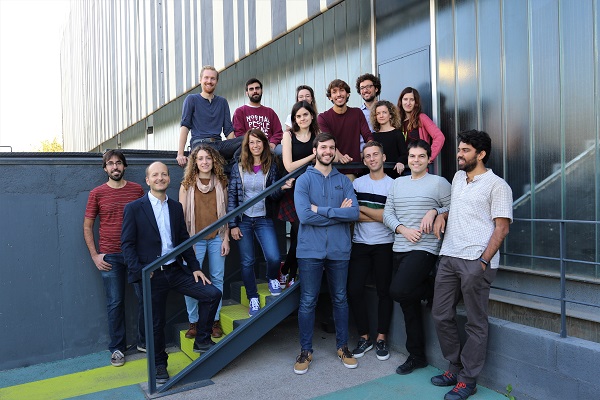The European Research Council (ERC) —a European public organization that funds research projects — has awarded Xavier Trepat, ICREA professor and principal investigator at the Institute for Bioengineering of Catalonia (IBEC), the prestigious Advanced Grant, worth with 2,5 M€. Before obtaining this grant, the researcher obtained the “Starting grant”, “Consolidator grant” and “Proof of Concept”, all of them granted by the ERC.
Thanks to this recognition, the expert will be able to develop the “EpiFold” project for five years, which will focus on understanding the principles and mechanical properties of 3D epithelium. In addition, Trepat and his team will take one step further and develop new technology to set the stage for a pioneering generation of biohybrid devices that would have a unique ability to enhance functions in biological robots.
All surfaces of our body, both internal and external, are covered by thin cellular layers called epithelia. The epithelial tissue plays a crucial role in fundamental human physiological functions, such as morphogenesis, filtration, transport, or protection againts pathogens. To study how this tissue works, it is important to first understand its three-dimensional shape and its mechanics, and for this, it is necessary to work with in vitro that mimic the conditions found in our bodies as closely as possible.
Currently, this is possible thanks to the different 3D models developed to date. However, the engineering principles that govern shape and epithelial mechanics in 3D remain largely unknown. For this reason, the “EpiFold” project will play a crucial role in unveiling these principles.
Specifically, the project aims to reveal the mechanical principles by which the epithelial tissue adopts and sustains its shape. By engineering tissues in vitro, Xavier Trepat and his team hope to understand how these 3D structures build themselves in vivo, to eventually to direct their formation. Furthermore, the project will also have a great impact on the emerging organoid field, as they will also study the shape and mechanics of intestinal organoids.
Developing a brand-new technology
What is most innovative and ambitious about this project is that these principles will be applied to the design of a new generation of biohybrid devices will a unique potential to power functions such as filtration, secretion, self-regeneration, or propulsion in soft robots.
This project will be the starting point of an entirely new technology called “Epifluidics” that will exploit the exceptional ability of sensing and actuation capacity of epithelial cells to design these biohybrid devices.
These unique micro-robots built with hydrogels and epithelia cell layers will be able to maintain the multifunctional and self-regenerating properties of the epithelium, as well as being able to sense, absorb, secrete, filter and carry out enzymatic activities.
“When a piece of a current robot breaks, we have no choice but to replace it. On the other hand, with biological robots we can get the parts to self-repair, since living tissues have the capacity to regenerate thanks to their stem cells,” says Trepat.
Accordingly, the expert adds that “thanks to thousands of years of evolution, living tissues are capable of performing more precise and efficient tasks than human-designed devices”, therefore, “we want to exploit this natural capacity of tissues to develop multifunctional robots” concludes Trepat.
The highly sought-after ERC Advanced grants are awarded to EU researchers with a recognized research history with significant scientific achievements in the past 10 years with the aim of supporting their cutting-edge research. This grants reward projects that have strong multidisciplinary and innovative applications in emerging fields. In this call, 1881 proposals were submitted, of which 185 have been selected for funding. With this new grant, to date, IBEC has received ERC funding for the development of 19 research projects.






